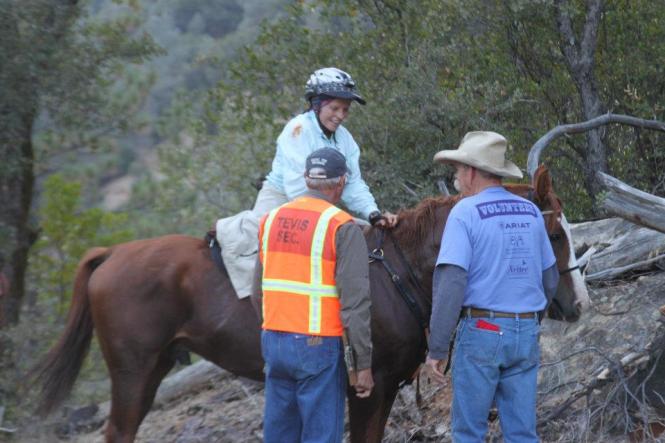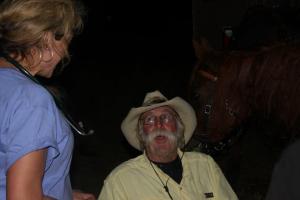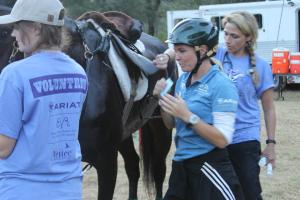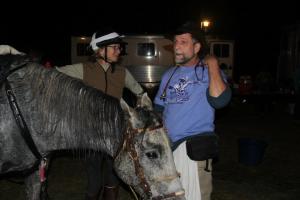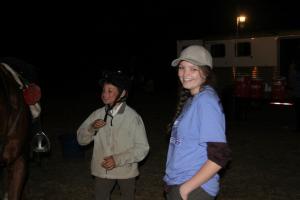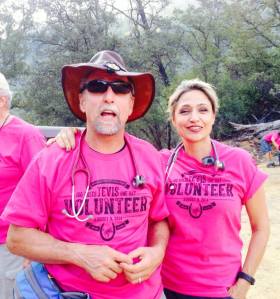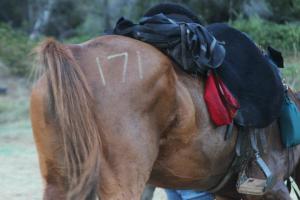By Elizabeth Speth
I love Sundays. In my mostly beautiful life, they are a high point.
On Sundays I saddle up my horse Cake, and we ride through beautiful places like this:

And this:

There is a little scotch in my flask. I take pictures. I enjoy the rhythm of Cake’s breathing and Mother Nature’s too.
On a recent Sunday, I hurriedly loaded my horse in the trailer at home, drove for a bit, unloaded him at a trailhead overlooking the American River Canyon and the famous Western States trail network. I unloaded my saddle and began brushing Cake as he munched grass. And then I saw blood on his flank.
I looked everywhere to find the source, and finally did. The underside of his tail, hidden to the casual eye, was a bloody pulp. It could have starred in its own horror movie. Further frantic examination revealed large swollen spots on his belly, possibly lymph nodes. Maybe abscesses. I couldn’t tell, and it was Sunday. A day my veterinary clinic reserves for emergencies. I needed help determining whether this was one, so I called the clinic on the spot and got the vet on the phone.
While I was describing Cake’s symptoms, a man parked his car next to me. A lean, sinewy, older fellow, dressed for running. He looked at me and my horse, and asked what was going on, even though I was clearly conversing on the phone. I held up one finger, and continued to explain my situation to the vet.
Running Man peppered me with a few more questions, which got tangled in my worried mind with the vet’s simultaneous queries.
Running Man: “Is your horse sick? Is he lame? What’s the problem? It’s a great day for riding. Are you going to go? Whatever it is, it can’t be that bad, can it? Oh, blood on the tail? That’s not a big deal, can’t your wrap it? Why don’t you just wrap it?”
I held up my finger again as my vet, a sweet and patient woman on her day off, asked me to snap some photos of the tail and belly, and then text them to her, so she could decide whether he should be seen emergently. I hung up, trying to figure out how to hold a now-dancing Cake, lift his tail, and snap pictures in enough light so they could be seen. Also, Running Man was beginning to frustrate me.
He asked again what was wrong, I told him briefly, and added that I was in the process of dealing with it with the vet.
He offered his opinion that we coddle our horses too much, it didn’t sound that bad to him, maybe I should just try this, or that, or maybe this other thing, which in his experience always worked …”
I was flustered. I said: “Sir, thank you, but I’m actually a bit distracted right now. The vet is waiting for pictures so she can help me determine what to do.”
“What to do is obvious,” he replied, even though he hadn’t actually seen the problem for himself. “You just blah, blah, blah.…”
“Sir,” I said. I really need to focus on this. “I’m getting veterinary help. Thank you very much. Enjoy your run. It’s a beautiful day.”
“Oh,” he said. “I’m going to run a bit in the canyon, maybe eight miles or so, although I’ve got this sore hamstring, but I think I can make it to that spot at the….blah, blah, blah…” That went on for a bit.
Meanwhile I”d dropped my phone twice, smeared it with blood, and finally managed to get the tail up to snap the picture by holding Cake’s lead rope in my teeth so his rear end was facing the good light.
“That doesn’t look too bad,” said Running Man. “Probably been rubbing it.”
(Because horses always rub themselves bloody for fun! Everyone knows this!)
He continued: “What you want to do is…”
I took a deep, deep breath.
“Listen. I’m in the process of figuring out to do with a veterinarian. Who is waiting for pictures. I’m flustered, and worried about my horse. I’m just having a little trouble giving you my full attention right now. I want to devote it to this.”
He drew himself up. “I finished Tevis (hundred mile equine endurance race), you know. It’s not like I don’t know what I’m talking about.”
What I wanted to say: “Good for you. I had no idea they handed out veterinary degrees upon completion.”
What I said: “Good for you. I’m going to call my vet now. Please excuse me.”
Running Man’s face hardened. His eyes narrowed meanly, right before he slowly and deliberately swept them over my flushed, sweaty, addled, disheveled self. I knew what he was going to say before he even said it. I both saw and felt it coming.
“Maybe,” said Running Man, “now that your horse is laid up, you can take up running. You look like you could use some exercise.”
My mouth dropped. The phone rang — my vet had received the pictures. Running Man said a few more things I did not hear because I turned my back on him.
My vet said: “That actually looks pretty awful, Elizabeth. Let’s get him in.”
I don’t remember when Running Man actually disappeared (hopefully forever). I loaded my horse and headed to the clinic.
I won’t leave you in suspense about poor Cake. He had an extreme allergic reaction to something he was grazing on in the pasture. Many daily scrubbings and ointments and medications later, he is on the mend.
My wounds, however, have been slower to heal, and I am stuck in the shadow of the Valley of the Mean People.
Because I don’t meet many of them, to tell you the truth. Very few people in my life exert themselves to annoy, irritate, aggravate, provoke, inconvenience, or wound me. The opposite is in fact the case. Even at work.
If your life is full of annoyers/irritators/aggravators/wounders, I am so very sorry. What a horrible, toxic thing. I wish you strength and courage. You can stop reading this now, because you are likely thinking I’ve been a naive idiot, living in a fool’s paradise on a fatty diet of illusions.
I started gnawing on this as soon as I knew Cake would live. Driving home from the vet clinic, a few dollars lighter, there were voices in my head.
My grandmother’s — I could hear her clearly — repeating one of her favorite phrases: “Well. He doesn’t have the sense God gave a goose, does he.” This was never a question for her. It was a statement. No question mark.
I thought about my grandfather, a big man with a booming voice who would have cold-cocked the goose senseless had he behaved thusly toward my grandmother.
As I turned into my driveway, my memory replayed one of my dear friend Stefan’s oft-repeated and much-beloved character summations: “What an ass-hat!”
It made me miss my grandmother, my grandfather, and Stefan, but it marginally comforted me. Stefan is the only one of the three I can still talk to about these things, grandmother and grandfather being long gone, and so I did. He is an incredibly articulate fellow, with a surgical precision when it comes to defining social boundaries and reasonable human interaction. I am a proud graduate of the Stefan Murphy Finishing School of Professional and Personal Excellence, and my diploma is treasured.
I know Stefan would have leveled the man with one polite phrase had he been in my scuffed-up riding boots (but his would be polished to a fine sheen, and manufactured for him personally by Ralph Lauren). Stefan would never have let the dialogue degenerate to the level of personal insults. He’d have sent Running Man packing definitively after his second ill-timed question. I know this about Stefan, but I can’t think fast enough on my feet to replicate what he does.

Stefan is the opposite of mean. If he is your friend, he will write impassioned letters on your behalf to people who wronged you in childhood. He jots down limericks on difficult days to cheer you up. He will devastate your enemy with a graceful insult.
So I decided to ask him instead how he copes with the aftermath of a mean person. Does he dismiss it? Let it go? Namaste his way through it and move on to bigger and better things? Or does he dwell on it, let the experience form an ulcer of angst in his soul? Because I was working on one of those.
“Oh I’m a dweller,” he assured me after I told him my sad tale, and we agreed Running Man wore an ass for a hat. “An Olympic caliber dweller. I could medal in the Dweller Decathlon.”
All right. I felt better. But I still had the spiritual hazardous spill to clean up. The ulcer to heal.
As the song says, there’s so much in this world to make us bleed. And, I’m sorry, I have to believe most of us in this world don’t really want that.
Sometimes, when I am stumped in the Compassion Generation Department, it helps to look at the world from the other guy’s perspective. Cover a mile in his proverbial running shoes, as it were. I thought of Running Man, and figured it was safe to conclude he is oblivious to social cues. He is self-involved, attention-demanding, and has a bit of a temper. He lashes out when he doesn’t get his way.
Overlooking the personal insult, he invaded my life at a time when I was terribly worried about my horse. He hijacked the situation and demanded an ego stroking. People rarely only do this now and then, to my way of thinking. It’s got to be a lifestyle, right?
So, when he interacts with people, they must respond to that fairly uniformly. When he executes his signature Running Man moves, people are likely often outraged and offended. So what does Running Man see then?
He sees narrowed eyes. Hard faces. Jaws set against him. He sees a hard, angry world, and it is possible he has no idea that he started all of that.
Of course, I don’t know his struggles. Maybe they are enormous. Maybe I would weep if I knew his hardships. There’s so much in this world to make us bleed.
These are the closest things I have to answers. Unlike my grandmother, some of my observations end in question marks. At least for a while.
I’m not excusing the ass-hat. He is going to have to get himself figured out, squared away. Or not. I’m just trying to get past him.
But first I want to say something to him.
Running Man: On the off-chance you read this, and it provokes/irritates/aggravates/wounds you, I want to paraphrase one of my favorite authors by way of explanation. If you want people to write/think fondly of you, you should have behaved better.
Let’s end on a good note, shall we? This is Cake. Feeling better.






